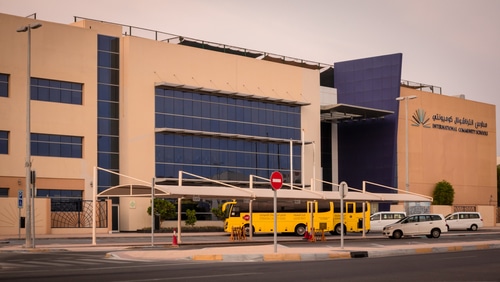Moving to the UAE is an exciting new chapter, but it also comes with important decisions, especially when it comes to your child’s education. With schools offering a variety of curricula, from British and American to International Baccalaureate (IB) and local options, it’s useful to understand what each one provides. Finding the right fit will help ensure a smooth transition and the best learning experience for your child.
At Remitly, we understand the challenges of settling into a new country and making informed choices for your family. That’s why we’ve created this guide to explain the different school curriculum options available in the UAE. Whether you’re looking for an internationally recognised programme or something closer to home, this article will help you explore the best options for your child’s education.
What is a school curriculum?
A school curriculum is the foundation of how students learn, how they’re assessed, and what qualifications they earn at the end of their studies. Each curriculum has its own teaching style, exam structure, and focus areas. Some may emphasise creativity and independent thinking, while others focus on structured learning and academic depth.
Why choosing the right curriculum matters
With so many options in the UAE, finding the right fit can make a big difference in your child’s education. Some children thrive in hands-on, project-based settings, while others do well with structured lessons and formal exams. The right choice can also influence university pathways, career opportunities, and even how easily your child adjusts to life in the UAE. It helps to research and take the time to explore your options to help set your child up for success both in school and beyond.
Popular school curriculum options in the UAE
The most popular options include the British curriculum, American curriculum, International Baccalaureate, and the UAE Ministry of Education curriculum. Each path suits different goals and learning styles, so it’s worth exploring what they offer in terms of content, style, and prospects.
British curriculum
The British curriculum follows a structured approach, guiding students through Key Stages before reaching IGCSEs (similar to GCSEs in the UK), followed by A-Levels or BTECs in secondary school.
This curriculum is well-known for its focus on academic depth, strong analytical skills, and a balance between core subjects like English, maths, and science alongside humanities and the arts. A-Levels, taken in Grade 12, are widely accepted for university admissions worldwide.
Many private schools in the UAE—particularly in Dubai and Sharjah—offer this curriculum, making it a great option for families who value a traditional yet globally recognised education.
American curriculum
The American curriculum takes a broader, more flexible approach to learning. Instead of a rigid exam structure, students earn credits across different subjects, including core areas like English, maths, science, and social studies. Students can also choose electives that allow for personal interests.
This system encourages creativity, extracurricular involvement, and adaptability. Standardised tests such as the SAT play a role in university admissions, and students aiming for a more challenging academic route can take Advanced Placement (AP) courses. If you’re looking for a well-rounded education that balances academics with personal growth, this curriculum is a strong contender.
International Baccalaureate (IB)
The IB is known for its inquiry-based learning and emphasis on critical thinking and global awareness. It includes different stages, but the most well-known is the IB Diploma Programme (for ages 16–19), where students study six subject groups, including languages, sciences, maths, and the arts.
Alongside these, students complete the Theory of Knowledge course, an Extended Essay, and a Creativity, Activity, and Service (CAS) project. This curriculum is ideal for students who enjoy independent learning and want to develop strong research and problem-solving skills. Many international schools in the UAE offer IB due to its reputation for preparing students for top universities worldwide.
UAE Ministry of Education curriculum
This curriculum follows the national education framework set by the UAE’s Ministry of Education, making it the standard in public schools and a common option in private schools that integrate local and international elements. Arabic language, Emirati culture, and Islamic studies (for Muslim students) are key components, ensuring students develop a strong understanding of local heritage.
In recent years, the curriculum has been enhanced with advanced science, technology, and innovation courses, complementing the UAE’s vision for future-ready education. For families looking for a curriculum that blends local values with modern learning opportunities, this option provides a solid foundation.

Key differences between the British and American curricula
Both the British and American curricula offer high-quality education, but they take very different approaches to learning, assessment, and university preparation. Understanding these differences can help you decide which system best suits your child’s strengths and future goals.
How they are structured
- British curriculum: Students follow a step-by-step progression through Key Stages, leading to IGCSEs (or GCSEs) in Grade 10 or 11 and then A-Levels or BTECs in Grade 12. This system focuses on specialisation in a few subjects in the final years.
- American curriculum: Instead of Key Stages, students earn credits each year from Grade 9 to 12 by completing a mix of core subjects and electives. By the end of high school, they receive a High School Diploma, with the option to take Advanced Placement (AP) courses for extra academic challenge.
How students are assessed
- British curriculum: Assessment is mostly based on final exams at major milestones, like IGCSEs and A-Levels. These exams focus on deep subject knowledge and analytical skills.
- American curriculum: Evaluation is more continuous, with a mix of class projects, coursework, quizzes, and tests, alongside standardised exams like the SAT or ACT for university applications. This approach rewards consistent effort rather than relying on final exam performance.
Learning style and academic focus
- British curriculum: Encourages structured learning and specialisation in key subjects at A-Level, making it ideal for students with clear career or university goals.
- American curriculum: Offers more flexibility, allowing students to explore different subjects through a variety of electives and extracurricular activities. If your child learns best in a less exam-focused and more well-rounded environment, this approach may be a good fit.
Choosing the right curriculum for your child
Finding the right school curriculum can feel overwhelming, but breaking it down into a few key factors to consider makes the process much easier. Every child has different learning preferences, future goals, and personal interests, so it helps to choose an approach that suits their strengths and aspirations.
Child’s learning style and academic needs
Think about how your child learns best. Do they thrive with structured exams and in-depth subject focus, or do they prefer a broader, more flexible approach?
The British curriculum leans towards subject specialisation with exam-based assessments, while the American system encourages continuous learning with a mix of coursework, tests, and projects. If your child enjoys independent research and global perspectives, the International Baccalaureate (IB) could be a great fit too.
Language is another key factor to consider, especially in an international context like the the UAE. British schools tend to follow UK-based resources, while American schools may include more US-centric content. Many schools in the UAE also offer bilingual education, which can be beneficial for students fluent in both English and Arabic.
Future education goals
If your child has a specific university path in mind, choosing the right curriculum can help the transition. A British curriculum (A-Levels) is widely accepted in the UK, Europe, and Commonwealth countries, while the American system (High School Diploma with SATs or AP courses) aligns with US university admissions.
The IB diploma is highly valued worldwide, making it a strong option for students considering multiple international destinations. If your family might return to your home country, there are other national curricula available in the UAE that can make reintegration easier.
Location and school reputation
With schools spread across Dubai, Abu Dhabi, and beyond, practical considerations like location and transport are just as important as academics. Check KHDA (Dubai) or ADEK (Abu Dhabi) ratings, read reviews, and talk to other parents to get a sense of teaching quality, student support, and extracurricular activities.
A school with well-trained teachers, a strong community, and a balanced approach to academics and well-being can make a huge difference in your child’s overall experience.
Taking the time to explore your options will help you find a school that not only meets academic expectations but also feels like the right fit for your child’s happiness and development.

Popular schools and their curriculum options
As well as academics, schools in the UAE focus on personal development, extracurricular activities, and international learning opportunities. Whether you’re looking for a school with a strong academic track record, a nurturing environment, or a curriculum that aligns with your future plans, there’s something for every family.
Emirates National School
With campuses across the Emirates, Emirates National School combines UAE Ministry guidelines with international education standards. This means students get a bilingual learning experience, studying core subjects in English while also developing a strong foundation in Arabic and Emirati culture.
For families looking for a globally recognised qualification, some campuses also offer the IB Diploma Programme for older students, preparing them for universities around the world.
GEMS education system
One of the largest private school groups in the UAE, GEMS Education runs schools offering British, American, IB, and other international curricula.
Each school has its own unique approach, but all focus on academic excellence, leadership skills, and creativity. Many GEMS schools have a strong reputation for high exam results and university placements, making them a popular choice for families who prioritise both academics and personal growth.
Other school institutions
The UAE is home to boutique-style schools for specific needs. Some schools follow Canadian, French, or German curricula, while others integrate career-focused subjects from Grade 9 onwards, preparing students for specialised fields in business, science, or the arts.
If you’re looking for an Emirati-based education, local public schools provide an in-depth focus on Arabic language, Islamic studies, and national heritage. This way, students stay connected to the country’s roots while gaining modern skills.
Tips for making an informed curriculum decision
With so many curriculum options available, finding the best fit for your child can feel overwhelming. The key is to do your research, understand what suits your child’s learning style, and choose a school that aligns with your expectations.
Explore school resources and reviews
Start by checking school websites to see what they offer in terms of subjects, teacher qualifications, and extracurricular activities. Official KHDA (Dubai) and ADEK (Abu Dhabi) inspection reports provide unbiased insights into a school’s performance, student support, and teaching quality.
It’s also useful to compare how different curricula handle exams (for example, if they rely on final assessments or continuous coursework) and how these qualifications impact university admissions.
Talk to education professionals
Academic counsellors, teachers, and education specialists can provide valuable guidance, especially if you don’t know much about a particular system. They can explain subtle differences, such as how IGCSEs help students specialise in subjects before A-Levels, or how the IB programme balances academics with creativity and community engagement. If your child is transitioning from a different country or language background, they can also suggest programmes to help with the adjustment.
Visit schools and attend open days
There’s no better way to get a feel for a school than by visiting in person. School tours let you observe classrooms, check out facilities, and see how teachers interact with students.
Open days are also a great opportunity to ask questions about student well-being, university preparation, language support, and extracurricular activities. You’ll also meet other parents, which can give you a sense of the school’s community and overall environment.
Taking the time to explore your options will make choosing the right curriculum much easier, ensuring your child gets an education that supports their growth and future ambitions.
FAQs
Which curriculum options are available in the UAE?
The UAE offers a variety of curricula, including the UAE Ministry of Education curriculum, British curriculum (IGCSE and A-Levels), American curriculum (High School Diploma), and the International Baccalaureate (IB). Some private schools also offer CBSE (Indian curriculum), French, German, and Canadian curricula, providing diverse options for families.
How do I choose the right curriculum for my child?
The best curriculum depends on your child’s learning style, future education goals, and preferred teaching approach. If they excel in structured exams and deep subject knowledge, the British curriculum may be a good fit. The American system is ideal for those who prefer a broader, more flexible learning experience. The IB programme encourages critical thinking and independent learning, while the UAE national curriculum integrates Arabic and Islamic studies with a strong local focus.
Which curriculum is best for university admissions?
All major curricula in the UAE are recognised by universities worldwide. A-Levels (British curriculum) are highly regarded in the UK, Europe, and Commonwealth countries. The American curriculum (High School Diploma with SATs or AP courses) aligns well with US university admissions. The IB Diploma Programme is widely accepted across global institutions.
Are international curricula accepted for higher education in the UAE?
Yes, most international schools follow curricula that align with global university requirements. Universities in the UAE accept students from British, American, IB, CBSE, and other international education systems, as long as they meet specific admission criteria.
